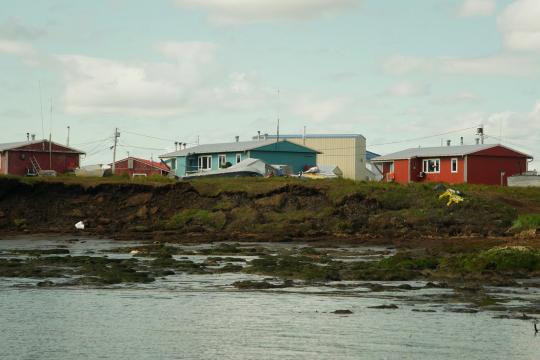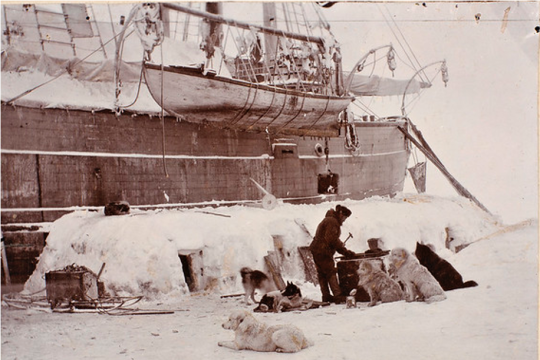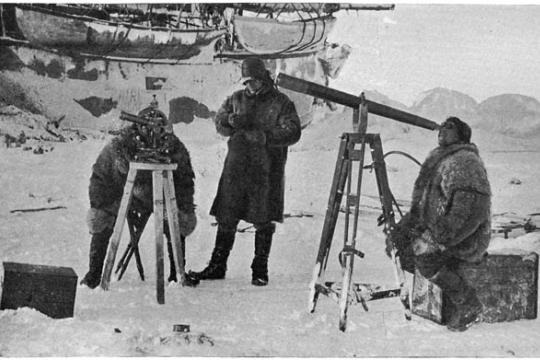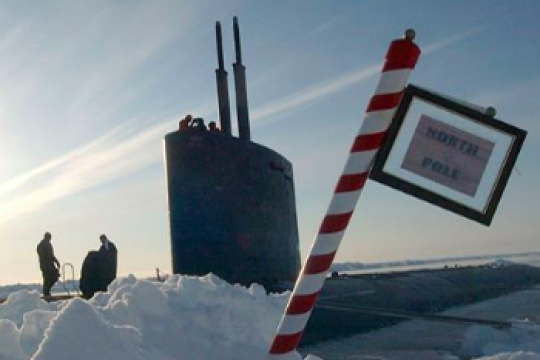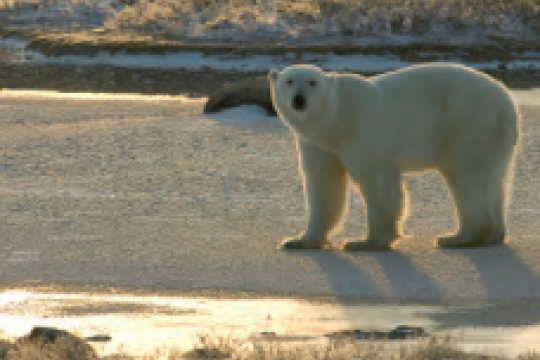ELA
Quick Bite: Climate Change Impacts on Indigenous Ways of Life
Indigenous peoples have over centuries adapted to living in the harsh and rugged Arctic, but their environment is changing rapidly. How are Indigenous peoples' ways of life being threatened by a changing climate? Photo credit: Eric Keto/Alaska's Energy Desk
Project of Mosaic Quick bite
Subject: Climate, ELA, Geography, mosaic monday
Grade Level: Middle School, High School
Developer: CIRES
Indigenous peoples have over centuries adapted to living in the harsh and rugged Arctic, but their environment is changing rapidly. How are Indigenous peoples' ways of life being threatened by a changing climate? Photo credit: Eric Keto/Alaska's Energy Desk
Project of Mosaic Quick bite
Subject: Climate, ELA, Geography, mosaic monday
Grade Level: Middle School, High School
Developer: CIRES
The Fram Expedition: Exploring the Unknown Polar Regions
Learn more about what was known and not known about the Arctic during the time of the 1893-1896 Fram expedition and what kinds of scientific observations they made during their three years locked in the ice. Check out the optional activity at the end of the reading where your students can compare the science goals of the 1893 Fram and 2019-2020 MOSAiC Arctic expeditions.
Project of Mosaic Quick bite
Subject: ELA, Expeditions, mosaic monday
Grade Level: Middle School, High School
Developer: CIRES
Learn more about what was known and not known about the Arctic during the time of the 1893-1896 Fram expedition and what kinds of scientific observations they made during their three years locked in the ice. Check out the optional activity at the end of the reading where your students can compare the science goals of the 1893 Fram and 2019-2020 MOSAiC Arctic expeditions.
Project of Mosaic Quick bite
Subject: ELA, Expeditions, mosaic monday
Grade Level: Middle School, High School
Developer: CIRES
Comparing the 1893 Fram and 2019 MOSAiC Expeditions
Compare the 1893 Fram and 2019 MOSAiC expeditions by reading and comparing firsthand accounts of each.
Project of Mosaic Quick bite
Subject: ELA, Expeditions, mosaic monday
Grade Level: Middle School, High School
Developer: CIRES
Compare the 1893 Fram and 2019 MOSAiC expeditions by reading and comparing firsthand accounts of each.
Project of Mosaic Quick bite
Subject: ELA, Expeditions, mosaic monday
Grade Level: Middle School, High School
Developer: CIRES
Cold Cases: Who Won the Race to the North Pole - Cook or Peary?
Students use primary sources to conduct a mock trial to debate whether Cook or Peary was the first explorer to reach the North Pole.
Lesson plan
Subject: Arguing from evidence, ELA, Expeditions, Geography, Obtaining and evaluating information
Grade Level: High School
Developer: Ohio State University
Students use primary sources to conduct a mock trial to debate whether Cook or Peary was the first explorer to reach the North Pole.
Lesson plan
Subject: Arguing from evidence, ELA, Expeditions, Geography, Obtaining and evaluating information
Grade Level: High School
Developer: Ohio State University
To Drill or Not to Drill? A Case Study in the Arctic National Wildlife Refuge
In a participatory problem-based activity students evaluate the impacts and benefits of drilling in the Arctic National Wildlife Refuge. Using primary sources, students learn more about the tundra ecosystem and the Arctic, conservation biology, economic and political issues surrounding ANWR, and social perspectives on drilling in a pristine environment.
Lesson plan
Subject: Ecosystems, ELA, Geopolitics, Life science, Obtaining and evaluating information
Grade Level: High School, University/college
Developer: Cassandra Runyon et al., SERC
In a participatory problem-based activity students evaluate the impacts and benefits of drilling in the Arctic National Wildlife Refuge. Using primary sources, students learn more about the tundra ecosystem and the Arctic, conservation biology, economic and political issues surrounding ANWR, and social perspectives on drilling in a pristine environment.
Lesson plan
Subject: Ecosystems, ELA, Geopolitics, Life science, Obtaining and evaluating information
Grade Level: High School, University/college
Developer: Cassandra Runyon et al., SERC
Arctic SMARTIC (Strategic Management of Resources in Times of Change)
Students will build off of an introductory presentation on climate change in the Arctic to devise a strategy to manage climate change impacts on a global scale (the Arctic). After a brief synopsis on current issues and management approaches in the Arctic, students will use information based on the stakeholders and interests they've identified in readings done before class, to pinpoint areas of high interest, negotiate conflicts, and develop a sustainable, multi-stakeholder management plan for high priority areas.
Lesson plan
Subject: Arguing from evidence, ELA, Geography, Obtaining and evaluating information
Grade Level: High School, University/college
Students will build off of an introductory presentation on climate change in the Arctic to devise a strategy to manage climate change impacts on a global scale (the Arctic). After a brief synopsis on current issues and management approaches in the Arctic, students will use information based on the stakeholders and interests they've identified in readings done before class, to pinpoint areas of high interest, negotiate conflicts, and develop a sustainable, multi-stakeholder management plan for high priority areas.
Lesson plan
Subject: Arguing from evidence, ELA, Geography, Obtaining and evaluating information
Grade Level: High School, University/college
Extreme Ecosystems: A Biodiversity Lesson
Students will identify and categorize plants and animals in the Arctic with an emphasis on which animals are endangered, threatened, or a species of special concern. Students will participate in individual species studies, presentations, and an interactive class trivia game.
Lesson plan
Subject: Ecosystems, ELA, Life science, Obtaining and evaluating information
Grade Level: 3-5, Middle School
Developer: Polar Bears International
Students will identify and categorize plants and animals in the Arctic with an emphasis on which animals are endangered, threatened, or a species of special concern. Students will participate in individual species studies, presentations, and an interactive class trivia game.
Lesson plan
Subject: Ecosystems, ELA, Life science, Obtaining and evaluating information
Grade Level: 3-5, Middle School
Developer: Polar Bears International
